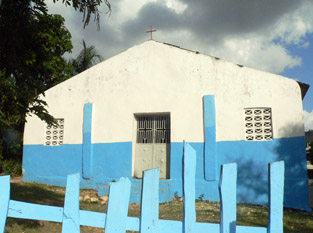
Sa ou plante se sa ou rèkolte.
What you plant is what you harvest.
In December 2010, Hospice St. Joseph and Haitian Ministries were merged into Diocese of Norwich Outreach to Haiti, Inc. Rather than an ending of two organizations, this merger signaled a new beginning and the bringing together of sister organizations already within the Diocese of Norwich that had a history of friendship and mission cooperation during their decades-long work in Haiti.
|
The native Taino Indians—who inhabited the island of Hispaniola when Columbus arrived in 1492—were almost annihilated by Spanish settlers within three decades. In the early 17th century, the French established a presence on Hispaniola. In 1697, Spain ceded to the French the western third of the island, which later became Haiti. The French colony, based on forestry and sugar-related industries, became one of the wealthiest in the Caribbean but only through the importation of African slaves and considerable environmental degradation. In the late 18th century, Haiti's nearly half million slaves revolted under General Toussaint L'Ouverture, who led the rebellion until his capture, deportation and subsequent death in France in 1803. After a prolonged struggle, Haiti became the first black republic to declare independence on January 1, 1804. General Jacques Dessalines, who had served under Toussaint L'Ouverture, was chosen as governor for life. He later crowned himself emperor and served two years before he was killed. Henri Christophe succeeded him. |
HOSPICE ST. JOSEPH was founded in 1989 by the Sisters of St. Joseph of Tipton, Indiana, and the Diocese of Lafayette Indiana, then under the leadership of The Most Reverend William L. Higi.
From its beginnings, the mission of Hospice St. Joseph emphasized the importance of providing educational opportunities and access to health care to Haitians in their struggle to secure a better life. These services have been provided from Hospice’s original campus in the Christ Roi neighborhood of Port-au-Prince. Also, Hospice St. Joseph has operated a guest house for international volunteers and visitors, as well as for patients from villages who are seeking medical care in the capital.
Sr. Ann Weller, CSJ, was the founding director of Hospice St. Joseph. Sr. Ellen Flynn, a Sister of Mercy from the Diocese of Norwich, served with Sr. Ann for 13 years. Together these courageous and faith-filled women, along with the Haitian staff and many dedicated American staff who followed, initiated and developed programs and built community relationships that continue to this day.
In 2002, after the Sisters of St. Joseph reorganized their community and were required to divest the sponsorship of Hospice St. Joseph, the Diocese of Norwich assumed the sponsorship. The transition to the Norwich Diocese was primarily due to the strong relationship Hospice enjoyed with Haitian Ministries.
 The roots of HAITIAN MINISTRIES go back 30 years. In 1981, Bishop Daniel P. Reilly, then bishop of the Diocese of Norwich, was invited to join a delegation from Boston for a visit to Haiti. This trip made a profound impression on him. In the following two years, he invited small groups of people from the Diocese to join him on further pilgrimages. Among those travelers—who also were deeply affected by their time in Haiti—was Fr. Jim Carini, who helped to organize follow-up trips from the Norwich Diocese in 1983 and 1984.
The roots of HAITIAN MINISTRIES go back 30 years. In 1981, Bishop Daniel P. Reilly, then bishop of the Diocese of Norwich, was invited to join a delegation from Boston for a visit to Haiti. This trip made a profound impression on him. In the following two years, he invited small groups of people from the Diocese to join him on further pilgrimages. Among those travelers—who also were deeply affected by their time in Haiti—was Fr. Jim Carini, who helped to organize follow-up trips from the Norwich Diocese in 1983 and 1984.
Fr. Carini soon became part of a diocesan group interested in developing an ongoing connection to Haiti. That group evolved into a task force, and Fr. Carini lived in Haiti for several months in early 1985, travelling throughout the country to meet with bishops and priests, missionary personnel, and local and international church organizations. In that effort, Sr. Marilyn Canning, RSM of the Norwich Diocese, joined him. Meanwhile, diocesan groups continued to visit Haiti.
Later in 1985, the task force recommended to Bishop Reilly that an Office of Haitian Ministries be established to educate Americans about Haiti. The sharing would touch on: the country of Haiti; the great needs among the people there; the diocesan involvement in the life of Haitian people; and the church’s missionary commitment to people throughout the world. As a second step, the task force recommended that, within two years, the Diocese establish a permanent presence in Haiti, both as a sign of solidarity with Haitians and as a way to develop a long-term, faith-based relationship with them.
Sr. Marilyn became the first director of Haitian Ministries, which immediately began laying the groundwork to open Norwich Mission House in the summer of 1987 on Delmas #60 in Petion-Ville.
The mission was further strengthened in 1995, when Bishop Reilly appointed Fr. Gerry Kirby as the Personal Representative of the Bishop of Norwich to Haiti. He served a dozen years there. Along with the ministry’s long-time Executive Director in Connecticut, Emily Smack, and Haitian staff and American volunteers, he developed stronger support for several Haitian-led organizations, including two orphanages. They also strengthened the Immersion Visits by Americans. Fr. Kirby’s focus included creating close connections with parish priests involved in the Twinning Program, which partners parishes in Haiti with parishes in the Norwich Diocese and beyond. The Norwich Diocese and the Archdiocese of Port-au-Prince signed a Twinning Covenant on December 17, 2000, when Bishop Daniel A. Hart was the Bishop of the Norwich Diocese. While in Haiti, Fr. Kirby developed close ties with Hospice St. Joseph, where he presided over Mass each week.
Over the years, much has happened in the lives of people in Haiti and throughout the Norwich Diocese and beyond. Today, Most Reverend Michael R. Cote, who became the Bishop of the Diocese of Norwich in May 2003, strives to preserve the mission of Outreach to Haiti, emphasizing the commitment to serve the people of Haiti in the spirit and values of the Gospel.
Today the Diocese of Norwich has a Chaplain & Twinning Director—Fr. Frank Rouleau, in Haiti.
The years have shown just how vital the Outreach programs are to the thousands of children, women, men, and families who are assisted annually, especially in times of disaster. Outreach remains committed to fortifying that assistance and to deepening the relationships that began many years ago.



